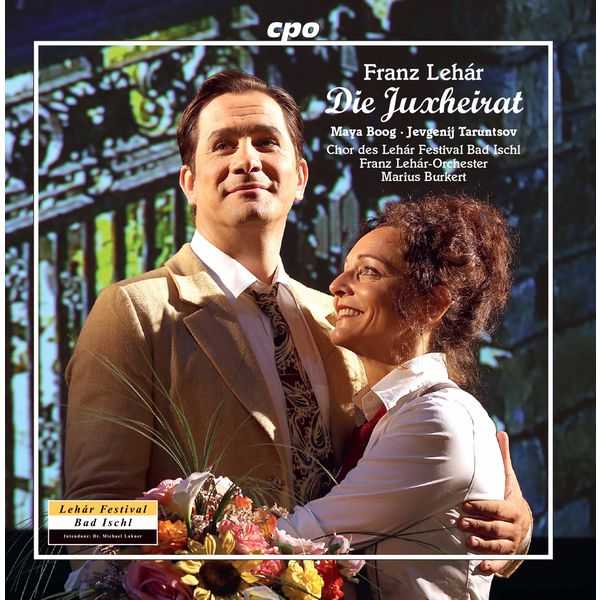
Composer: Franz Lehár
Performer: Gerhard Ernst, Maya Boog, Jevgenij Taruntsov, Alexander Kaimbacher, Sieglinde Feldhofer, Ilia Staple, Rita Peterl, Chor des Lehar Festivals Bad Ischl
Orchestra: Franz Lehár Orchestra
Conductor: Marius Burkert
Format: FLAC (tracks)
Label: CPO
Catalogue: 555049-2
Release: 2017
Size: 519 MB
Recovery: +3%
Scan: yes
Die Juxheirat
CD 01
Act I
01. Genug, Ihr sprengt mir ja die Ohren (Thomas Brockwiller, Miss Phoebe, Chorus)
02. Trinken wir noch eins (Thomas Brockwiller, Miss Phoebe)
03. Quintet: Die Luft ist rein (Selma, Miss Phoebe, Miss Edith, Miss Euphrasia, Juliane von Reckenburg)
04. Und nun, Miss Grant (Selma, Miss Phoebe, Miss Edith, Miss Euphrasia, Juliane von Reckenburg)
05. Also hier das Revier (Harold von Reckenburg)
06. Mein lieber Herr von Reckenburg (Selma)
07. Arietta and Trio: Sie also, mein süßestes Herrchen (Selma, Miss Phoebe, Juliane von Reckenburg)
08. Bitte, später (Philly Kaps)
09. Meine Hochachtung (Philly Kaps)
10. Duet: O du Böser (Miss Phoebe, Philly Kaps)
11. So geben Sie doch acht! (Miss Phoebe, Philly Kaps)
12. Finale: Es hört sich wie ein Märchen an (Thomas Brockwiller, Selma, Captain Arthur, Miss Phoebe, Miss Edith, Miss Euphrasia, Harold von Reckenburg, Philly Kaps, Chorus)
Act II
13. Entr’act
14. Trio: Nein, diesmal sollen Sie (Captain Arthur, Miss Phoebe, Juliane von Reckenburg)
15. Was seh ich? (Captain Arthur, Miss Phoebe, Juliane von Reckenburg)
16. Duet: Mein Ritter muss ein Künstler sein (Thomas Brockwiller, Miss Edith)
CD 02
Act II
01. Mit diesem Trübsalblasen (Harold von Reckenburg, Philly Kaps)
02. So kommen wir wahrhaftig vor (Harold von Reckenburg, Philly Kaps)
03. Nun meine Damen (Harold von Reckenburg, Philly Kaps)
04. Interlude: Was könnte man ersinnen? (Selma, Miss Phoebe, Miss Edith, Miss Euphrasia)
05. Was geht hier vor? (Selma, Miss Phoebe, Miss Edith, Miss Euphrasia)
06. So wär’ es wahr (Captain Arthur)
07. Ich habe mit dir zu sprechen (Captain Arthur)
08. Was zaudern Sie? (Selma, Chorus)
09. Das nennen Sie einen Kuss? (Selma)
10. Trio: Bei Gott, ich wollte (Miss Phoebe, Miss Euphrasia, Philly Kaps)
11. Die Sache trollt mir durch den Kopf (Miss Phoebe, Miss Euphrasia, Philly Kaps)
12. Finale: Hej, das war ein Fahren (Thomas Brockwiller, Selma, Captain Arthur, Miss Phoebe, Miss Edith, Miss Euphrasia, Harold von Reckenburg, Juliane von Reckenburg, Philly Kaps, Huckland)
Act III
13. Entr’acte
14. Introduction: Ich stutze und putze den Nagelrand (Miss Phoebe, Philly Kaps)
15. Und was haben Sie für Nachrichten? (Miss Phoebe, Philly Kaps)
16. Arietta: Ozu den Mann bekämpfen? (Miss Phoebe)
17. Ach meine Schwägerin (Miss Phoebe)
18. Couplet: Ging ein Knab’ im Mondenschein (Philly Kaps)
19. Meine liebe Freundin (Philly Kaps)
20. Finale: Tiefes Schweigen in der Runde (All)
Julius Bauer, a man known not only for his intelligent, original, and witty texts but also as Vienna’s most influential theater critic, wrote the libretto for Die Juxheirat in 1904. This wild, dizzying, surprising, and bold work was far ahead of its times as well as reminiscent of The Taming of the Shrew – only carried to the absolute extreme. The shrew is a frustrated widow and suffragette, and the male protagonist is just the opposite of a lady-tamer: overtaxed and irritated, he just wants to live out his love. Michael Lakner, then the director of the Lehár Festival, declared in an interview, ‘I am especially fond of this operetta with a story taking us to the United States around 1900. Franz Lehár’s name is above all associated with The Merry Widow, his great worldwide success; a year before he had already written Die Juxheirat. During his lifetime this work was performed only forty times. And we are presenting this conversation operetta in a semiscenic performance.’ The conductor Markus Burkert elaborated and reconstructed this work note by note; the musicians pieced their parts together note by note. ‘They also take this commitment with them into the performance – and play with verve the interesting waltzes, marches, and ensemble pieces. The fact that the Franz Lehár Orchestra also produces a wonderful, transparent, and lively sound makes it the perfect ensemble for the operetta genre.’ – BR-Klassik Operetta Review. A bold and daring Lehár without his otherwise typical sentimentalities – quite the discovery!